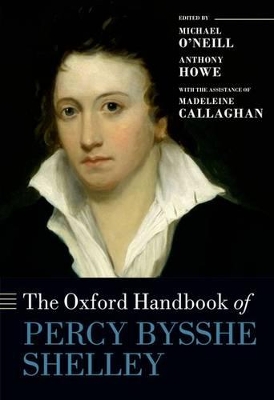Oxford Handbooks
1 total work
The Oxford Handbook of Percy Bysshe Shelley takes stock of developments in the study of a major Romantic poet and prose writer, and seeks to advance Shelley studies in new directions. It consists of forty-two chapters written by an international cast of established and emerging scholar-critics. This Handbook is divided into five thematic sections: Biography and Relationships; Prose; Poetry; Cultures, Traditions, Influences, and Afterlives. The first
section reappraises Shelley's life and relationships, including those with his publishers through whom he sought to reach an audience for the 'Ashes and sparks' of his thought, and with women, creative collaborators as well as muse-figures. The second section gives his under-investigated prose works detailed
attention, bringing multiple perspectives to bear on his conceptual positions, and demonstrating the range of his achievement in prose works from novels to political and poetic treatises. The third section explores Shelley's creativity and gift as a poet, emphasizing his capacity to excel in many different poetic genres. The fourth section looks at Shelley's response to past and present literary cultures, both English and international, and at his immersion in science, music, theatre, the
visual arts, and travel. The fifth section concludes the volume by analyzing Shelley's literary and cultural afterlife, from his influence on Victorians and Moderns, to his status as the exemplary poet for Deconstruction. Packed with stimulating insights and readings. The Oxford Handbook of Percy Bysshe
Shelley brings out the relevance to Shelley's own work of his dictum that 'All high poetry is infinite'.
section reappraises Shelley's life and relationships, including those with his publishers through whom he sought to reach an audience for the 'Ashes and sparks' of his thought, and with women, creative collaborators as well as muse-figures. The second section gives his under-investigated prose works detailed
attention, bringing multiple perspectives to bear on his conceptual positions, and demonstrating the range of his achievement in prose works from novels to political and poetic treatises. The third section explores Shelley's creativity and gift as a poet, emphasizing his capacity to excel in many different poetic genres. The fourth section looks at Shelley's response to past and present literary cultures, both English and international, and at his immersion in science, music, theatre, the
visual arts, and travel. The fifth section concludes the volume by analyzing Shelley's literary and cultural afterlife, from his influence on Victorians and Moderns, to his status as the exemplary poet for Deconstruction. Packed with stimulating insights and readings. The Oxford Handbook of Percy Bysshe
Shelley brings out the relevance to Shelley's own work of his dictum that 'All high poetry is infinite'.
